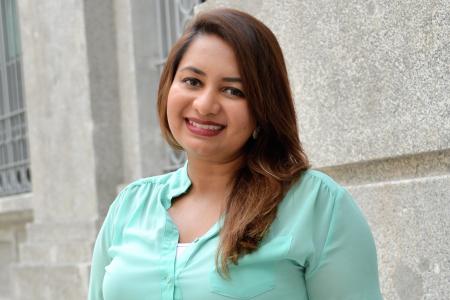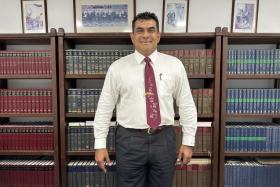A heart for pro-bono causes
Lawyer takes 30 per cent pay cut to join year-long Criminal Aid Legal Scheme Fellowship
Keeping a mentally ill man with an underwear fetish out of prison is one of the highlights of her time at the Criminal Legal Aid Scheme (CLAS) Fellowship.
For CLAS Fellow Sujatha Selvakumar, 30, it is the ability to fight for marginalised segments of society that drew her to the programme.
She is in the inaugural batch of lawyers in the year-long Fellowship that has five lawyers doing criminal legal aid work full-time. They are hired by the Law Society.
"I do a lot of voluntary work in the community and I did a lot of pro bono work (professionally), so I thought this would be a natural fit," said Ms Sujatha, who volunteers for the Singapore Indian Development Association and also helps out in grassroots work.
A lawyer for four years with Straits Law Practice, she took a 30 per cent pay cut when she joined the Fellowship.
She said she now handles a load of between 25 and 30 active cases at any one time, but the luxury of not having to keep an eye on the clock is liberating.
"In a law firm, pro bono work is a side project because there are clients who are paying you and KPIs (key performance indexes) and work hours to meet," she said.
"(At the Pro Bono Services Office), you get to spend as long as you need with an accused person.
"Often, you meet people who have mental illnesses or social problems, so you need to have the time to sit down, hear them out and work with them through their issues."
A proponent of rehabilitative justice, Ms Sujatha believes that having a programme like the Fellowship is the closest thing Singapore has to a public defender's office, and also shows us moving towards a more compassionate society.
"There's understanding that people commit crimes when they fall through the social safety nets, or as a result of psychiatric issues not merely because they are recalcitrant," she said.
REHABILITATION
She added that she would like to see more done in the area of rehabilitative justice and community-based sentences.
In community-based sentences, instead of being sent to prison for long periods, criminals can be ordered to seek treatment for their issues, do community service, or to report to a centre daily for counselling and rehabilitation.
And for those on the defence, a win can be as simple as keeping a client out of prison.
One of the first cases Ms Sujatha took on in January was the man with the underwear fetish. He had cross-dressed and was caught exposing himself in public.
The man had a long history of being in and out of jail for similar offences, with his last incarceration in 2011.
Prison was not a solution and the man needed help, Ms Sujatha said, and she requested for him to undergo a psychiatric evaluation.
It turned out that he had fetishism after having been sexually abused as a child. His father had similar issues and his mother was a gambler with alcohol problems.
"We highlighted his psychiatric illness (to the court) and he worked well with us in seeking voluntary treatment.
"In the end, he was fined $2,000 instead of getting jail time," she said with a proud smile.
It is this dedication to her clients that sets Ms Sujatha apart, said criminal lawyer Josephus Tan, who is a mentor in the Fellowship programme.
"She has the heart for the pro bono cause, which is something that we look for in Fellows," he added.
Mr Tan was the lead counsel in a recent case where they defended Robiah Lia Caniago, an Indonesian who was fined $3,000 last month for running a curry puff operation in her flat.
She served a five-day jail sentence in default when she was unable to pay the fine.
They represented her under CLAS' ad hoc scheme because her offence did not fall under the area covered by the regular scheme.
Mr Tan said: "When someone feels so strongly for the (pro bono) cause, there's sustainability. Hopefully, at the end of the Fellowship, she (Ms Sujatha) can bring this passion back to her peers."
I do a lot of voluntary work in the community and I did a lot of pro bono work (professionally), so I thought this would be a natural fit.
- Ms Sujatha Selvakumar
ABOUT CLAS
The Criminal Legal Aid Scheme (CLAS) was started in 1985 to provide needy accused with legal representation in theft offences.
It now covers offences in 16 areas and it is in the process of widening its reach.
Starting this year, the scheme was expanded to include the CLAS Fellowship.
Five junior lawyers, stationed full-time at the Pro Bono Services Office in the State Courts, now work full-time on CLAS cases.
The Fellows go through a 31-module criminal law training programme on a wide variety of topics and have in-depth discussions with experienced criminal lawyers who act as mentors.
Some of these mentors include the late Mr Subhas Anandan, Mr Josephus Tan and Senior Counsel N Sreenivasan.
Those in the programme also get to visit various agencies involved in the criminal justice system, such as the Singapore Police Force and Institute of Mental Health.
Get The New Paper on your phone with the free TNP app. Download from the Apple App Store or Google Play Store now


